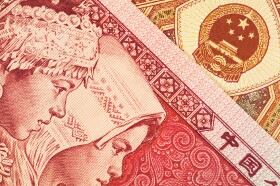The Chinese yuan fell below a key level against the US dollar to kick off the trading week after President Donald Trump announced new tariffs on billions in Chinese goods. While some experts posit that it might not have any economic significance, the trend could escalate tensions between the worldâs two largest economies over trade and the exchange rate — two topics important to Washington.
Last week, the White House confirmed that it would be imposing a new 10% tariff on the remaining $300 billion in Chinese imports. The president was displeased by Beijing not purchasing more American agriculture and failing to prevent the flow of fentanyl into the US. This surprised markets, especially as American and Chinese trade representatives renewed trade negotiations last week.
Chinaâs Ministry of Commerce responded to the move, promising ânecessary countermeasures to resolutely defend its core interests.â
But the latest escalation impacted the yuan, sending it below the politically sensitive level of seven against the greenback, which is the lowest level in 11 years. Experts had thought that the currency had rebounded to start 2019, but the yuan has shed more than 4% in the last six months.
There are a few sides to consider in this regard.
The first is that the yuanâs weakness might prompt US officials to complain about a weaker yuan making the nationâs exports cheaper, affecting foreign markets and enhancing Beijingâs trade surplus. The second is that the Trump administration could accuse the Peopleâs Bank of China (PBOC) of purposely letting the yuan slide â the Treasury Department refused to label China currency manipulator in May. The third is that there might be a dramatic increase in capital outflows, causing the federal government to impose capital controls, a move that would sour market sentiment.
In June, Pan Gongsheng, chief of the State Administration of Foreign Exchange (SState Administration of Foreign Exchange (S, suggested that the financial regulatory agency would not allow the yuan to fall below that crucial level. It is unclear if any governmental body is taking action to address this trend, but officials have said that they want to avoid âcompetitive devaluation.â
President Trump has already commented on the yuan sliding to a decade-low, tweeting:
China dropped the price of their currency to an almost a historic low. Itâs called âcurrency manipulation.â Are you listening Federal Reserve? This is a major violation which will greatly weaken China over time!
On the data front, the Caixin Services purchasing managersâ index (PMI) clocked in at 51.6 in July, down from 52.0 in the previous month. The Caixin Composite PMI edged up from 50.6 in June to 50.9 in July.
The USD/CNY currency pair surged 1.62% to 7.0524, from an opening of 6.9402, at 14:53 GMT on Monday. The EUR/CNY spiked 2.4% to 7.8934, from an opening of 7.7095.
If you have any questions, comments, or opinions regarding the Chinese Yuan, feel free to post them using the commentary form below.
